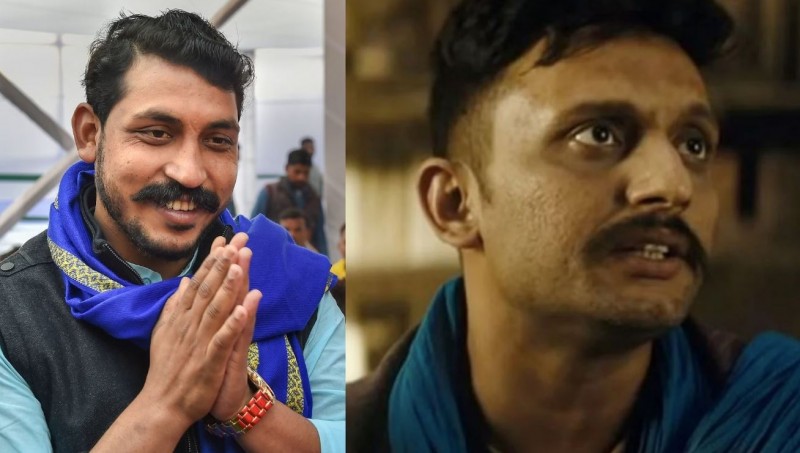
Anubhav Sinha's 2019 crime drama "Article 15," which is set in India, delves deeply into the problems of caste-based prejudice and social injustice in that country. Nishad, who is expertly portrayed by actor Mohd. Zeeshan Ayyub, is one of the movie's most notable characters. The social activist played by Nishad, who is fiery and committed, is crucial in revealing the horrifying truths behind the caste-based atrocities that took place in a small town. Though Nishad is a fictional character, many people think that he was modelled after Chandrashekhar Azad Ravan, a social activist and co-founder of the Bhim Army. The goal of this article is to examine the parallels and discrepancies between Chandrashekhar Azad Ravan's character Nishad and the real-world struggles and aspirations of activists by highlighting these similarities and differences.
Understanding the setting of "Article 15" is crucial before delving into the character of Nishad. The Indian Constitution's Article 15, which forbids discrimination on the basis of race, religion, caste, sex, or place of birth, serves as the inspiration for the title of the movie. The story centres on IPS officer Ayan Ranjan (played by Ayushmann Khurrana), who is assigned to look into the disappearance of three Dalit girls and posted in a small town in Uttar Pradesh. Ayan discovers a web of caste-based prejudice, corruption, and brutality as he investigates the case further.
As a charismatic and outspoken social activist, Nishad is introduced in the Mohd Zeeshan Ayyub performance. He is fearless when it comes to questioning the status quo and is deeply committed to battling the oppressive caste system. With his assistance in Ayan Ranjan's pursuit of justice and revelation of the horrors endured by the Dalit community, Nishad emerges as a key character in the story of the movie.
Known for his social activism, Chandrashekhar Azad Ravan is one of the co-founders of the Bhim Army. His tireless efforts to end caste-based prejudice and violence against the Dalit community helped him become well-known. Chandrashekhar Azad, who is a charismatic leader and has led protests and movements in support of Dalit rights and social justice, is similar to Nishad in that he has a history of organising powerful rallies.
Fearless Advocacy: Chandrashekhar Azad Ravan and Nishad share a number of striking similarities, including their fearless support for the rights of underrepresented groups. Both characters are unapologetically pursuing justice and equality and are not afraid to stand up to powerful oppressors.
Charismatic Leadership: Chandrashekhar Azad possessed the same leadership qualities as Nishad in his ability to mobilise people and persuade them to support his cause. Both possess the charisma and conviction necessary to inspire movements and organise communities in opposition to caste-based prejudice.
Activism Against Caste Discrimination: Nishad's character in "Article 15" focuses primarily on his battle against caste prejudice. Similar to this, Chandrashekhar Azad Ravan has devoted his life to battling the deeply ingrained caste hierarchy and promoting a more equitable society.
Resistance through Education: In the film, Nishad manages a school for Dalit kids, giving them a chance for empowerment and education. The emphasis on education by Chandrashekhar Azad to empower the Dalit community and end the cycle of oppression is mirrored by this.
Authorities: Because of their activism, both Nishad and Chandrashekhar Azad have run into trouble with the law and had run-ins with the authorities. Conflicts between Nishad and local police and officials in the movie mirror the struggles that activists like Chandrashekhar Azad faced in real life.
While the fictional character of Nishad in the movie "Article 15" is inspired by Chandrashekhar Azad Ravan, it's important to note that Nishad was created specifically for the movie. As a result, there are notable variations between the two:
Fictional vs. Real: Chandrashekhar Azad Ravan is a real-life activist, whereas Nishad is a fictional character. Chandrashekhar Azad's experiences are grounded in reality, whereas Nishad's story is a creation of the film's narrative.
Specificity of the Cause: The investigation into a specific case involving the disappearance of Dalit girls is the main focus of Nishad's character. In contrast, Chandrashekhar Azad Ravan's activism covers a wide range of caste prejudice and social injustice issues.
Geographical Setting: Chandrashekhar Azad's activism spans a wider geographical area, covering several regions in India, whereas Nishad operates in a fictitious small town in Uttar Pradesh.
Nishad's personality may have been dramatised and changed for the sake of the plot in the movie. Chandrashekhar Azad Ravan's life and activism, in contrast, are based on real-world events and documented occurrences.
Characters like "Nishad" from "Article 15" are strong and compelling representations of real-world activists like Chandrashekhar Azad Ravan, whose struggles and goals are reflected in the story. Even though Nishad is a made-up character, the movie does a great job of capturing the spirit of the struggle against caste-based discrimination and the unwavering commitment of those who stand up for justice and equality. "Article 15" highlights the urgent need to address the pervasive problems of caste-based discrimination in India as well as the tireless efforts of people and movements working to bring about social change by taking inspiration from real-life activists.
Ten Most Popular Bollywood Icons: A Glance at Elegance, Talent, and Stardom
Deewangi Deewangi: A Bollywood Marvel with 31 Star-Studded Cameos